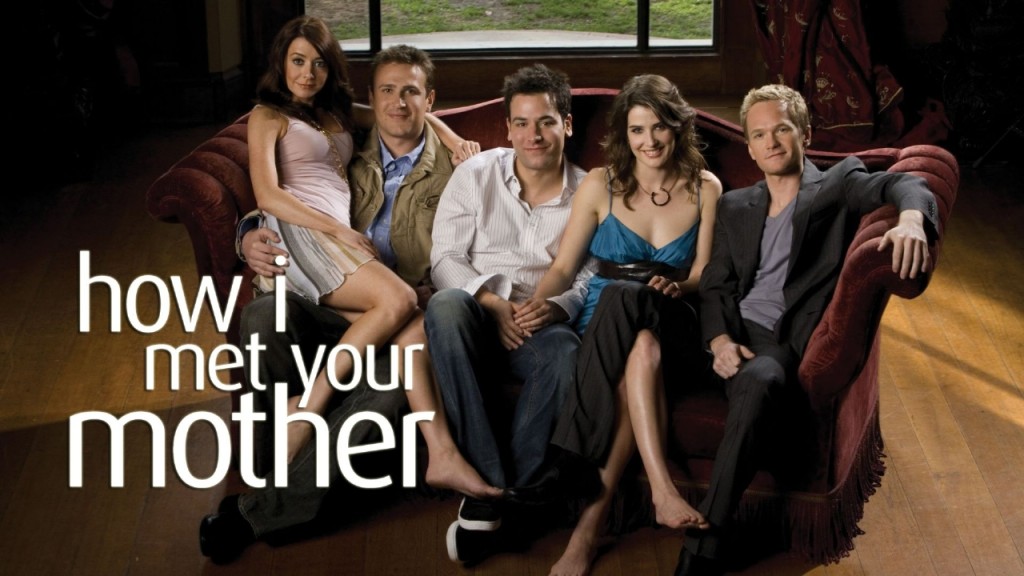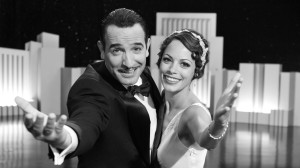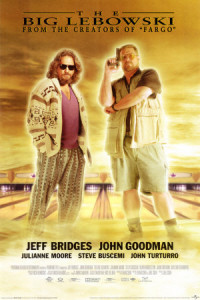A significant part of contemporary American culture is film. Over time, American film has evolved from silent, black and white pictures to high action, CGI animation. The 2011 Academy Award winning film “The Artist” celebrates the history of American film by telling the story of a silent film era actor, George Valentin, and the struggle he faces as talking pictures become popularized. What makes this film so unique is that the movie itself is a silent, black and white film. The character of George is faced with change in the movie and is forced to accept the evolving film landscape, but the film itself uses the forms of early American film to portray how, in the midst of change, it is important to remember one’s roots. This film illustrates how American literature is constantly changing, yet it withholds traditions and often commemorates the past. By using a silent film to tell the story of the silent film era, “The Artist” explores what it means to honor the past while still looking forward. It is a love story to the growth of the American film industry and the hope that film will continue to advance and make an impact on society.
Monthly Archives: November 2013
A Supermarket In California in American Beauty
In his poem A Supermarket in California, Allen Ginsberg stresses his idea that American ideals and values have been altered in order to accommodate new ones that on the surface, appear better than they actually are. These artificial ideas are, what Ginsberg believes to be, shaping the new America—An America in which the whole is more regarded for than the individual. In the last lines of the poem, Ginsberg compares the state of American to Charon (the boatman, who in Greek mythology, ferried the dead to Hades) quitting poling his ferry, as Walt Whitman watches the boat disappear in the black waters of forgetfulness. If America is an optimistic man forgetting the past, values essential to our positive existence will be forever lost.
Even though A Supermarket In California was written fifty-seven years ago, its ideas remain contemporary. In the 1999 film American Beauty, director Sam Mendes and writer Alan Ball explore the de-individualizing impact that American conformity has on the average American and how by remembering the past, a sense of self can be restored. The film’s protagonist is Lester Burnham—a man in his 40s who, despite having the family, the job and the house that all Americans are “supposed” to aspire to obtain—is extremely depressed. Early in the film, Lester narrates how he has lost his sense of self. When he remembers his life without the limitations and restrictions that currently bound him into his depression, the film’s story kicks in, his soul is lifted and he no longer dreads the familiar mundaneness of his American life.
Both American Beauty and A Supermarket in California pay ode to Walt Whitman and his ideas. American Beauty reinforces Ginsberg’s prediction of a tediously conformed America, while using the Whitmanesque ideas of rebirth and reawakening. Unfortunately, Allen Ginsberg died in 1997, two years before American Beauty was released. If he were to see the movie, I think he would enjoy it. He would be comforted by the fact that a man who is de-individualized by American conformity is reawakened (much like Whitman in Song of Myself) to find purpose in a clouded world.
Janelle Monae and the New Other

Singer and songwriter Janelle Monae spreads a very specific message about blackness. The message is two-fold. First, her carefully chosen wardrobe of stylish tuxedoes defines her public image. This ties in closely to the message her music propagates to society. Her lyrics talk about what it means to be the “other.” In her songs she refers to her alter ego, Cindi Mayweather, who is from the year 2719 and is an android. Monae believes that androids represent society’s new “other.” She compares androids to being homosexual or a black woman. The goal of her music is to make those who feel oppressed have something to connect with. She hands out her Ten Driod Commandments to her fans, which encourages them to be individuals. There has been talk of her sexual orientation, which she has yet to define. Monae is quoted in a 2011 interview in The Evening Standard saying, “I only date androids.” Rumors about her being a lesbian began circulating because of her style and certain lines of her songs referencing women in particular ways. Monae is adamant about not defining herself in society’s terms, which is why I think she has taken on the persona of an android.
As stated previously, her songs and style are intertwined. She wants to redefine women’s wear. Being an individual should be celebrated not looked down upon. She has been features in Vogue and other publications as well as won multiple awards for her music, which places her in the public’s eye. Society has a long way to go before each individual who walks on this Earth is truly accepted for who they are, but that fact that Monae is welcomed and applauded for her individuality is a step in the right direction. Her use of artistic freedom is making a positive change for those who feel like they are the “other.”
Link to the Ten Driod Commandments: http://hollygocrunkly.tumblr.com/post/746007554/the-ten-droid-commandments
Living an Apple Pie Life
In the television show, Supernatural, two brothers spend their days fighting paranormal forces, a duty left to them by their father. They strive to live “the American Dream,” but at the end of the day, they always get pulled back into the world of hunting. The idea of living a normal life provides the brothers with a hope that everything they’re doing and all the hard work they’re putting in to save the general public will eventually pay off in the long run. What they call “an apple pie life” gives them a sense of purpose because otherwise, their lives would feel pointless.
This can be said for many contemporary Americans as well. We are raised to believe that through hard work, we can realize any dream that we want to in our lives. We go through years of school to attain knowledge and to gain experience that we’re told will help us to achieve these goals, but sometimes hard work isn’t enough. The Winchester brothers are an example of this sad truth, because after years of nothing but hard work, they are still in the same (if not worse) predicament that they were in when the show began nine years ago.
Here’s a clip of Dean’s brief attempt at a normal life:
No longer “Stickin’ with The Pig” American Narrative

America has always been narrated by change and promoting change for a better place to live. Clarence Saunders founded the first Piggly Wiggly in Tennessee in 1916. It was the first self-serve grocery store ever. Prior to the opening of The Pig, clerks gathered groceries for the customers. This new idea was unheard of but flourished regardless and made way for many chains of self-serve grocery stores.
The American narrative promoting change holds true in the recent purchases of Piggly Wiggly stores by Harris Teeter and Bi-Lo. Piggly Wiggly’s motto “Local since forever” will remain in effect with the continued employment of Piggly Wiggly employees. Randall Onstead, president and CEO of Bi-Lo Holdings plans to enhance the purchased stores by, “’reinvest[ing] in what matters most for our customers … the freshest foods, the best deals and really connecting to their neighborhoods’” (ABC news Charelston). It sounds like Bi-Lo plans to keep the “Local Since Forever” motto but with all change comes sacrifice. Many “Stickin’ with The Pig” customers are not happy about the buy out, since they have been going to the same stores forever. People are bound to be unhappy by the changes Bi-Lo chooses to make to better “enhance” the stores. Only time will tell if these changes are beneficial to the majority or not, but America (and the first Piggly Wiggly) were founded on change and it will always narrate our country.
How America Changes
Throughout this semester we have seen a lot of American authors who want to do something different. Not just to be different, but because America was not what the great authors that preceded them promised. I must argue that this is an ongoing theme in America even today. One of the most amusing examples to me is the new TV show Sleepy Hollow. In the show Ichabod, a revolutionary comes back to life in modern day Sleepy Hollow only to find it has changed a great deal. There are some obvious things that surprise him at first, like cars, but he quickly begins criticizing modern Americans for how they are living. Many times he points out that this America is not the one that our Founding Fathers were creating. We can find this theme in a good many more TV shows, movies and books that are very recent. I believe that this is partially due to the strain we currently have on our society, and also because the world is not living up to the expectations of generations before ours.
How I Met Walt Whitman
 “How I Met Your Mother” tells the story of architect Ted Mosby as he recounts it to his children in the year 2030. Over 9 seasons, the last and final of which is still running, Ted recalls his life year by year. The show uses flashbacks liberally, and the narrative is often non-linear to add suspense and drama. Ted’s stories always include his best friends: couple-since-college Marshall and Lily, wingman Barney, and all around Canadian Robin.
“How I Met Your Mother” tells the story of architect Ted Mosby as he recounts it to his children in the year 2030. Over 9 seasons, the last and final of which is still running, Ted recalls his life year by year. The show uses flashbacks liberally, and the narrative is often non-linear to add suspense and drama. Ted’s stories always include his best friends: couple-since-college Marshall and Lily, wingman Barney, and all around Canadian Robin.
In many ways, this show is a modern “Song of Myself,” a lonely man searching for, and ultimately finding, meaning in relationships. This is one of the core elements of the American dream – the melting pot, the idea that when everyone comes together all their dreams can collectively come true. HIMYM doesn’t stop there, but embodies the American dream in many ways:
1. A-bang-bang-bangity bang. Happiness is pursued frequently, single-mindedly, and by all. In several episodes the show pokes mild fun at virgins, or even anyone who hasn’t had sex for a while (“a while” being 5 months). Barney is sometimes seen questioning whether his promiscuous ways make him happy, but the answer is usually always “yes.” All in all, the show if not endorses, certainly advertises free sex.
2. The One. The focus of the whole show is Ted’s never-ending chase of “the One” – the woman who is perfect for him, who will make him happy for the rest of his life. In the wake of his chase is the foul dust of broken relationships and multiple restarts. Gatsby, anyone?
3. The Story. Throughout the show, the importance of the story over the facts is emphasized many times. The use of flashbacks makes this not only an important point, but a central part of the show. Often the narrator admits that he doesn’t remember what happened, and stories are told differently from different viewpoints.
The American dream is the lifeblood of How I Met Your Mother – an epic tale, a hero, a quest for happiness – and two super bored kids sitting on a couch for nine years.
American Narratives and The Big Lebowski
Since the founding of this nation, the American literary tradition has been concerned with what it means to be American and how the country holds up to its idealistic aspirations. Specifically, the American literary tradition has concerned itself with the existence of certain idealized American qualities, such as the American dream, American exceptionalism, resilience, opportunity, hard work and standing up for what is right.
For example, Crevecoeur praised the American work ethnic and the opportunities that the country allowed the common man to achieve. Naturalist writers, like Stephen Crane, offered tales that examined the existence of these ideal American qualities in regard to the lower and less privileged classes. While mid 20th century poets expressed the reality that this ideal vision of America did not apply to the black or female populations.
I feel that The Big Lebowski follows this tradition of investigating the existence of ideal American values by taking our ideal view of America and flipping it upside down. The film attacks and mocks traditional American values and reveals the hypocrisy that is evident in our society. The movie’s main character, Jeffrey “The Dude” Lebowski, is not the typical American hero rather he is the laziest man in all of Los Angeles County who simply wants to get stoned and get compensation for his rug. “The Dude” represents a more realistic American man who is lazy, unmotivated and nonchalant. However, “The Big Lebowski”, the old paraplegic millionaire, that “The Dude” gets mistaken for claims that he achieved the American dream through hard work and perseverance when he really just married into his wealth. Even worse, he is attempting to embezzle money away from the charity for disadvantaged children he created. “The Big Lebowski” pokes fun at mythical American qualities that we constantly look for in our society while presenting us with many of the dysfunctional elements that we tend to ignore.
“We begin with history”:Nikky Finney’s National Book Award Acceptance Speech
I could have written about Miley Cryus, American Horror Story, Urban Outfitters or Dunkin Donuts- really anything I see or hear on a daily basis somehow corresponds to the way the country we live in constructs American identity. But nothing resonates the way Nikky Finney’s National Book Award speech does. Her book Head Off & Split could be studied alongside any of our texts this semester, and her acceptance speech for the award the book won should be as well. Not only does her story prove that a person with a dream can make that dream a reality, but that an African American girl can as well. Like the southern gothic writers we’ve read (Welty, Faulker, Wright), she rewrites any trace of southern nostalgia by beginning her speech with a slave code forbidding anyone from teaching or circulating any literary material written for or by slaves. This, of course, should remind us just how remarkable Phyllis Wheatley’s story is. Finney continues to thank those who have helped her along the way, all of whom carry with them the ideals the country likes to pride itself upon: hardworking, compassionate, unresisting, and intelligent men and women. Finney’s address to her mother who, “made Christmas, Thanksgiving, and birthdays out of foil, lace, cardboard, and paper mache, insisting beauty into our deeply segregated southern days.” Reminds me of Gwendolyn Brooks’ “Kitchenette building” which celebrates the hardships of black, segregated urban life just because that life is beautiful thanks to those working to find beauty in it. While it may seem obvious that a contemporary poet’s award speech would comment on the types of American narratives we’ve been reading, I didn’t realize exactly just how much it would cover. From Crevecoeur to Hughes, Finney fits right in. And who, American or not, could not be proud to hear what she had to say at that podium? Thanks to YouTube, I can hear it on repeat.
The full transcript of her speech can be found here .
Captain Phillips: An American Narrative
The movie Captain Phillips is not a typical American narrative at first thought. This movie embodies American men who take a freight ship across the Indian Ocean, and are attacked and held hostage by Somali pirates. Audiences are shocked not only by the greusome nature and violence of the Somali pirates, but also by the way in which Captain Phillips puts his crew before himself. This, as we have learned in class, is one of the greatest American narratives we could strive to achieve.
In this movie, the United States military sends Navy Seals to rescue Captain Phillips from the hands of the Somali pirates. This representation of America sticking together and not taking negotiations from foreign pirates further demonstrates the ideal American dream: a nation that comes together in a time of crisis and stands as one single unit that is ready for any challenge that the world may bring on to it.
This film is based on the true story of Captain Richard Phillips who was manning the Maersk Alabama in 2009 when it was attacked and held hostage by Somali pirates. Because this film is not fictional, we can clearly see that the American Dream still thrives to this day, and is not just a re-imagination of America’s past. Although this particular dream has many roadblocks along the way, it all comes together in the end as the United States stands together and intimidates its challengers enough to keep them at bay. This is a true and contemporary narration of twenty-first century America.



